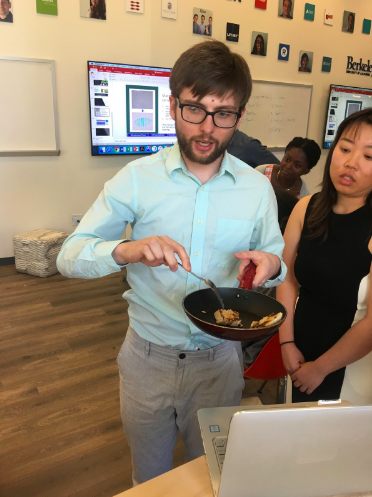Delicious New Protein Source, starting with a Salmon Burger: Terramino Foods
We’ve all heard this: Today’s animal farming and growing protein consumption is unsustainable. A few stats:
-
Animal farming takes up over 70% of the planet’s agricultural land, and 70% of the world’s available freshwater and energy consumption.
-
Animal production consumes more than 1/3 of raw materials and fossil fuels in the US.
-
It is responsible for 18% of the total release of greenhouse gases , 9% of global CO2, 80% of ammonia emissions in the U.S. come from animal waste.
A growing global population, combined with factors such as changing socio-demographics, will place increased pressure on the world’s resources to provide not only more but also different types of food. Increased demand for animal-based protein in particular is expected to have a negative environmental impact, generating greenhouse gas emissions, requiring more water and more land. Addressing this “perfect storm” will necessitate more sustainable production of existing sources of protein as well as alternative sources for direct human consumption.
With this in mind, Collaborative Fund has invested in companies creating alternative protein and dairy that are non-sacrificial on taste and health (self-interest + broad-interest). Some of our notable investments in the sector are Beyond Meat, Impossible Foods, Ripple Foods, Modern Meadow, Hampton Creek and some others still in steal behind this thesis.
In addition to meat and dairy alternatives, we’ve been closely paying attention to seafood.
Globally, fish account for approximately 4 of every 10lbs of animal products consumed. To meet the growing demand, 90% of global fish stocks are overfished. Global fisheries are expected to collapse by 2048. And there is growing risk in human health with high levels of mercury, PCBs, dioxins and other health containments.
But unlike chicken, pork and beef alternatives becoming more available, seafood alternatives are virtually non-existent. Alternative seafood options are very limited even at Whole Foods, and the taste and quality for these select products are subpar. We’ve realized there’s a gaping hole in alternative seafoods.
After years of studying, searching, and trying out seafood alternative options, we believe we found an exciting team tackling this, Terramino Foods.
I first met Kimberlie and Joshua at the plant-based seafood competition for a program at Sutardja Center for Entrepreneurship and Technology at UC Berkeley. After students’ presentations of their semester-long research and only few real samples to try out, Kimberlie and Joshua easily stood out. They cooked me a “salmon” burger on the spot. It wasn’t perfect, but I was quite impressed by their dedication and working relationship — they had already worked together for some time towards an entrepreneurial dream upon graduation. Of course they won the 1st place, and I invited them to IndieBio happy hour the following day. Needless to say, they got accepted into its sixth class and continued working diligently.

We’ve followed their progress, and whenever I made a quick visit to IndieBio space, Kimberlie and Joshua were usually the last ones to stay around, iterating on products and making some experimentation. Their work ethic definitely stood out, not to mention their food science knowledge and nimble iteration on the product.
Towards the end of the IndieBio program, our team caught up and had a chance to try out their latest Salmon burger (with their own plant-based mayo they took as a fun experimentation) . We have tried a few other seafood alternative options in the past. Terrmino’s Salmon burger was incredible.
To capture the larger market share in the food space, we came to believe that taste (next to ingredients and affordability) matters most, especially for broader adoption. I liked it so much that I asked to finish the entire burger.
More than its taste, its fungi protein source, and cost curve, is poised to grow into attractive economics, where most protein alternative startups struggle. With this ever-more-scalable source of new protein, Terramino can build many more products beyond its first salmon burger. The power of broad platform is what excites us.
Kim’s upbringing in the food industry and and relationship with chefs (her mom is a winner of Master chef) and Joshua’s food science knowledge, we think Kim and Josh are a great dynamic duo.
It’s a thrill to see this coming in full circle — knowing Kimberlie and Joshua as students, helping them through an accelerator, and now co-leading their last round with True Ventures, a co-investor with us in other businesses like Blue Bottle.
We’re thrilled for what’s ahead and cannot wait to try out more products they’ll make!